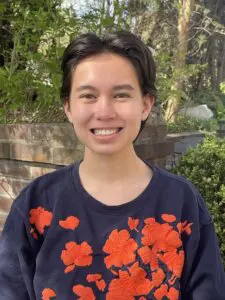Sofia Kelly, a sophomore at Haldane High School and the founder of its environmental club, will speak on May 17 at the annual Youth Climate Summit at the Garrison School.
 What are you planning to talk about?
What are you planning to talk about?
I want to share the mission of my club and why it’s so important. It’s about restoring nature through the removal of invasive species and the reinstatement of native plants. I got the idea during the pandemic shutdown, when I spent lots of time walking in the woods, identifying plants. Walking around the West Point Foundry Preserve, I noticed lots of invasive monocultures, such as mugwort. When I started the club last year, I called it the Habitat Revival Club, although it’s officially called the Environmental Club. We have 44 members. It’s massive.
What else will you be discussing?
I plan to talk about the need to convert lawns into pollinator gardens. Lawns serve no purpose for the environment. They’re ecological dead space. Nothing feeds there and very little lives there. Lawns originated as a status symbol. If you could afford land that wasn’t farmland, that meant you were wealthy. I want to change that cultural conversation. It’s not a status symbol. It’s a waste of land where you could be doing something beneficial.
What are some of the things the club has done?
We installed two pollinator gardens behind the high school. Starting last June, we removed most of the invasive plants manually. Then we covered the ground with cardboard to suppress regrowth. We brought in soil and woodchips. We put in pussywillow, coneflowers, asters, hyssops and mountain mint. We put in 200 native plants. It’s a really efficient habitat. We see bees, butterflies and hummingbirds. We started with plugs and now they’re massive plants. They’re doing amazing.
We’ve done movie nights, night hikes and a workshop with landscape architect Erin Muir called “The Work That Reconnects.” It was focused on remembering our ecological identity and understanding where we are in our ecosystem.
What invasive species did you find on campus?
We’ve mostly been dealing with mugwort. There’s a lot of it behind the high school. You see a lot of Japanese knotweed and porcelain berry. There’s invasive tansy in the retention basin. You also see Japanese barberry around the edges of the campus.
We’ve heard you plan to bring in goats?
We received a $4,500 grant from the Haldane School Foundation to bring in two goats to clear invasive species, and then we’ll put in native plants. We’ve been in touch with a group in Rhinebeck called Green Goats. We’re not certain of the timeline, but we envision, possibly next year, putting in a tall cattle fence so none of the students can get in and the goats can’t get out. The goat’s food would be whatever vegetation we want them to clear. We’ll provide shelter to protect them from the weather. Our only responsibility would be bringing them water every day. We’re still working out the details, but we would love to see this project come to fruition.

